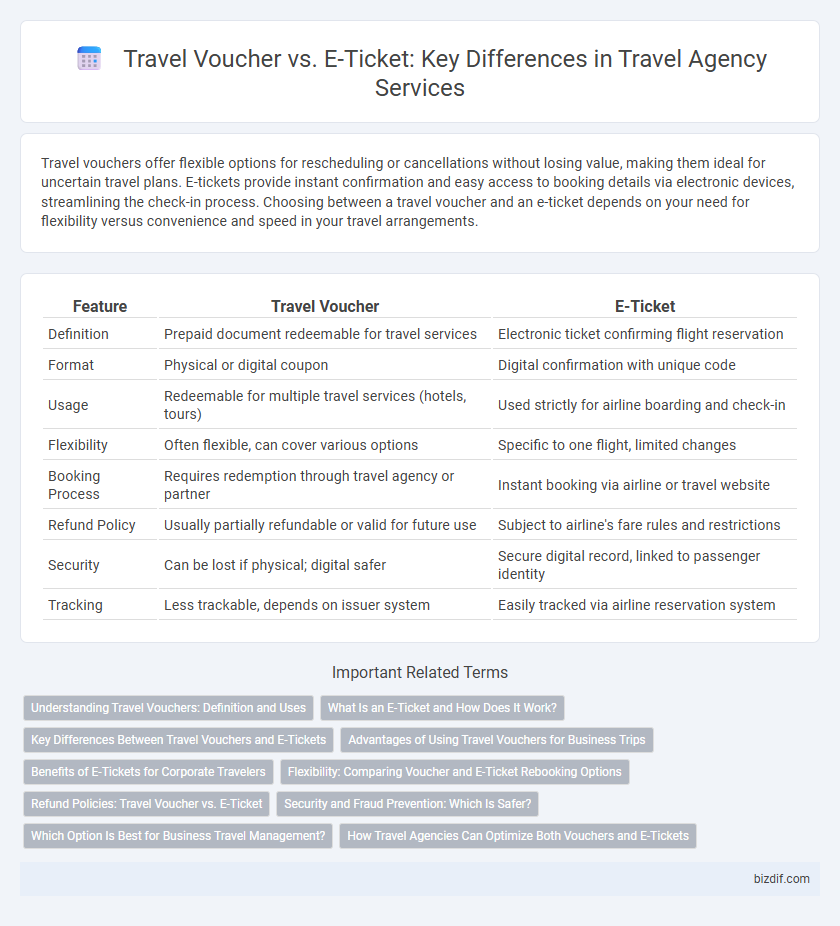Travel vouchers offer flexible options for rescheduling or cancellations without losing value, making them ideal for uncertain travel plans. E-tickets provide instant confirmation and easy access to booking details via electronic devices, streamlining the check-in process. Choosing between a travel voucher and an e-ticket depends on your need for flexibility versus convenience and speed in your travel arrangements.
Table of Comparison
| Feature | Travel Voucher | E-Ticket |
|---|---|---|
| Definition | Prepaid document redeemable for travel services | Electronic ticket confirming flight reservation |
| Format | Physical or digital coupon | Digital confirmation with unique code |
| Usage | Redeemable for multiple travel services (hotels, tours) | Used strictly for airline boarding and check-in |
| Flexibility | Often flexible, can cover various options | Specific to one flight, limited changes |
| Booking Process | Requires redemption through travel agency or partner | Instant booking via airline or travel website |
| Refund Policy | Usually partially refundable or valid for future use | Subject to airline's fare rules and restrictions |
| Security | Can be lost if physical; digital safer | Secure digital record, linked to passenger identity |
| Tracking | Less trackable, depends on issuer system | Easily tracked via airline reservation system |
Understanding Travel Vouchers: Definition and Uses
Travel vouchers are prepaid certificates issued by travel agencies or airlines that can be redeemed for specific travel services such as flights, hotel stays, or tours, often used as compensation or promotional offers. Unlike e-tickets, which are electronic records confirming a passenger's purchase and reservation details, travel vouchers serve as credit towards future travel bookings but do not guarantee assigned seats or travel dates until redeemed. Their flexible nature makes travel vouchers a valuable alternative for customers seeking refundable or reschedulable options while planning trips through travel agencies.
What Is an E-Ticket and How Does It Work?
An e-ticket is a digital travel document issued electronically, serving as proof of purchase and reservation for flights, hotels, or other travel services. It eliminates the need for a physical ticket by storing all travel details in an airline or travel agency's database, accessible via a unique booking reference or QR code. Travelers simply present their e-ticket information at check-in or boarding, streamlining the process and enhancing convenience compared to traditional travel vouchers.
Key Differences Between Travel Vouchers and E-Tickets
Travel vouchers are prepaid certificates issued by travel agencies as compensation or promotional offers, redeemable for future travel services, whereas e-tickets are electronic tickets confirming a traveler's booked itinerary with airlines, hotels, or transportation providers. Unlike e-tickets, travel vouchers often have expiration dates and may be subject to specific usage restrictions, limiting flexibility compared to the instantly accessible, fully operational e-tickets. The primary difference lies in travel vouchers representing credit value toward purchases, while e-tickets serve as proof of purchase and enable boarding or accommodation access.
Advantages of Using Travel Vouchers for Business Trips
Travel vouchers offer businesses enhanced flexibility by allowing employees to select preferred travel options within a pre-approved budget, reducing administrative overhead compared to fixed e-tickets. They simplify expense management through consolidated billing and can be easily reallocated or modified without penalty, accommodating last-minute changes during business trips. This flexibility supports cost control while improving employee satisfaction and travel efficiency.
Benefits of E-Tickets for Corporate Travelers
E-tickets streamline corporate travel by offering immediate delivery and easy access through digital devices, reducing the risk of loss compared to traditional travel vouchers. They facilitate seamless itinerary management and instant updates, enhancing flexibility for business travelers with tight schedules. Corporate travelers benefit from automated expense tracking and simplified reimbursement processes enabled by e-ticket systems.
Flexibility: Comparing Voucher and E-Ticket Rebooking Options
Travel vouchers offer greater flexibility by allowing travelers to rebook trips without strict time limits or penalties, adapting easily to changing plans. E-tickets, while convenient and instantly accessible, often come with specific rebooking policies and fees set by airlines or service providers. Choosing between them depends on the traveler's preference for adaptability versus immediate ticket confirmation.
Refund Policies: Travel Voucher vs. E-Ticket
Travel vouchers typically offer flexible refund policies, allowing customers to use the credit for future bookings instead of requiring immediate reimbursement. E-tickets often have stricter refund rules tied to airline or service provider policies, with eligibility and fees varying by fare type. Understanding these differences helps travelers make informed decisions based on cancellation likelihood and budget constraints.
Security and Fraud Prevention: Which Is Safer?
Travel vouchers offer limited fraud risks as they are issued directly by agencies with unique codes tied to customer accounts, reducing the chances of unauthorized use. E-tickets rely on secure electronic systems with encryption and real-time verification, making them difficult to counterfeit but vulnerable to phishing scams if personal details are compromised. Both methods incorporate strong security protocols, but travel vouchers provide an extra layer of fraud prevention through controlled physical or digital issuance.
Which Option Is Best for Business Travel Management?
Travel vouchers offer flexibility by allowing businesses to prepay for travel services and allocate expenses across multiple employees, simplifying budget control. E-tickets provide real-time booking confirmation, easy electronic management, and seamless integration with corporate travel software for efficient itinerary tracking. For business travel management, e-tickets are optimal due to their convenience, speed, and compatibility with digital expense reporting systems.
How Travel Agencies Can Optimize Both Vouchers and E-Tickets
Travel agencies can optimize travel vouchers and e-tickets by integrating flexible voucher systems with seamless digital ticketing platforms to enhance customer convenience and reduce processing time. Implementing automated tracking and redemption processes for vouchers alongside real-time e-ticket updates increases operational efficiency and minimizes errors. Leveraging data analytics from both vouchers and e-tickets provides insights to personalize offers, improve customer satisfaction, and boost revenue streams.
Travel voucher vs E-ticket Infographic

 bizdif.com
bizdif.com